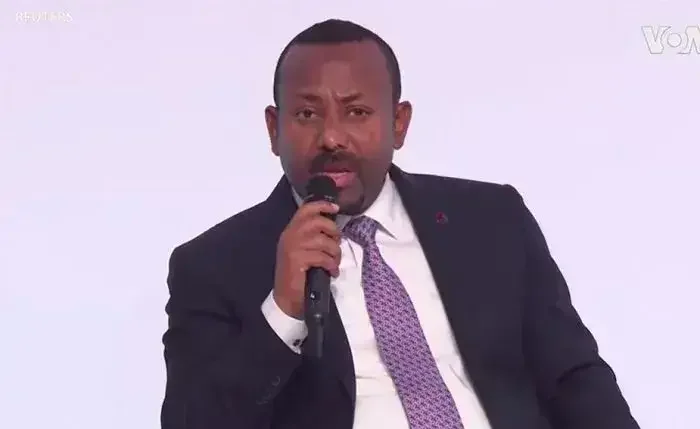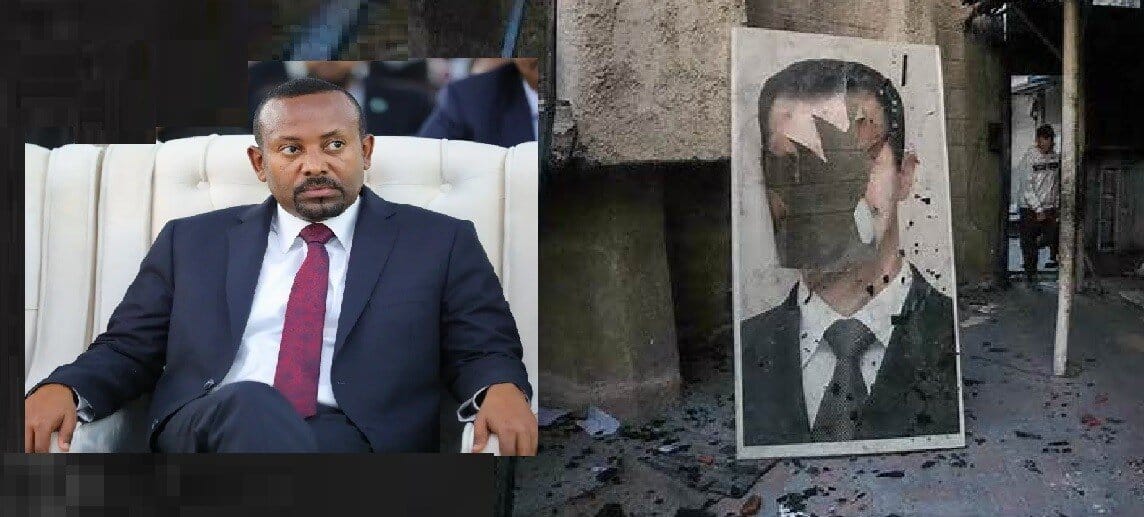Part II
The International Pariah

By Haile Tessema
(This is part II of an instalment covering the embarrassing behaviour of Abiy Ahmed)
The Paris Debacle
Abiy Ahmed’s participation in the recent Paris conference, during which he made misleading statements, was rebuffed by the head of the World Bank, and was widely ignored by world leaders, underscores his reputation as bungling pariah.
Abiy Ahmed’s false statement, on a global platform, claiming that the term of appointment for Ajay Banga, the new head of the World Bank, was two years was undeniably embarrassing. The erroneous claim exposes his lack of basic facts. It is a straightforward piece of information that could easily have been confirmed with a simple Google search. The easy accessibility of this information amplifies the embarrassment.
Abiy Ahmed’s false remark also sheds light on his unpreparedness when participating in international fora. In international public appearances, where accurate information is essential, leaders come briefed, prepared, and well-informed, with their claims fact-checked for accuracy. As a leader of a country, he is expected to invest the necessary effort to ensure he is well informed. His error highlights his inability to handle global affairs with the required level of diligence.
Abiy Ahmed’s mistake regarding the term of employment for the head of the World Bank has cast doubt on his comprehension of complex issues. If he doesn’t know a simple fact, people may ask: Does he have the patience or the capacity to comprehend intricate matters such as financing climate change?
Abiy Ahmed was rebuked by Mr. Banga, who corrected him by stating that his term of office at the World Bank is five years. The rebuke by Banga has two purposes. He highlighted Abiy’s ignorance of a basic fact regarding the World Bank as an institution. More importantly, the rebuke implied that Abiy may be unqualified to make policy recommendations to the World Bank.
Abiy Ahmed claimed that his government spends $50 billion on planting trees, a false claim that can be easily verified. His hyperbolic assertion reinforces his untrustworthiness, as no country, regardless of its citizens’ dedication to environmental rehabilitation, would allocate 50% of its GDP to tree planting. This false claim highlights his reputation as a deceitful leader, even unable to craft plausible lies.
In addition, he unabashedly announced to the world that Ethiopia has begun to export wheat, disregarding the dire humanitarian situation where international food aid organisations are tirelessly striving to feed the needy. His government’s decision to export wheat amid a severe shortage of food in Ethiopia indicates a profound lack of empathy for its people. He may have anticipated that his statement would impress the global community, instead it unveiled a leader with little concern for the well-being of its citizens. A leader without sympathy for his people is a leader without respect from his people.
The contrast between Abiy Ahmed and William Ruto, the president of Kenya, was stark, in style and substance. They both participated in a panel discussion of prominent individuals. While Ruto was confident, articulate, and persuasive, Abiy appeared timid, insecure, tongue-tied, and unconvincing. Abiy falsely claimed that Ethiopia spends $50 billion on planting trees; Ruto boldly proposed the establishment of a green bank to assist developing countries in financing their transition to green technology. Abiy came across as a fraudster, Ruto as a thinker.
I am not too naïve not to realise that Ruto is being groomed as the West’s main man in Africa. Ruto has been portrayed as a good leader with good qualities that align with the expectations of the Western world. This portrayal emphasises his strong leadership skills, his ability to communicate effectively, and his strategic thinking. Presenting Ruto in this light positions him to advance the interests of the West in Africa.
Western media and diplomats present Kenya as a shining example of democratic governance in the African continent, despite its many democratic deficits. Ruto, although recently elected, has been associated with this positive portrayal of Kenya. He is presented as a leader who upholds democratic values and principles. Even if we acknowledge the democratic tendencies in Kenya, we need to be aware of the underlying motive behind the media’s promotion of Ruto. Nonetheless, the contrast between Ruto and Abiy Ahmed remains significant.
Abiy Ahmed’s Humiliation: The International Snubs
Regrettably, yet predictably, Abiy Ahmed endured palpable snubs at the recent summit in Paris from the President of South Africa, the Chairman of the African Union Commission, and the head of the International Monetary Fund (IMF), all in one day! These snubs indicate the substantial decline in global respect for Abiy Ahmed and diminished international reputation for Ethiopia. It was disheartening to witness him wandering aimlessly in the reception hall, desperately seeking someone to engage in conversation with. He resembled an unwanted individual at a high school party, shunned by everyone but longing for anyone willing to engage in a chat. It was a sad spectacle. This experience may have momentarily bruised his ego but has permanently shattered the pride that Ethiopians once held in him.
A snub involves actively disregarding, rejecting, or slighting someone in a disrespectful or disdainful manner. Abiy Ahmed experienced several humiliating snubs at the Paris summit in the reception hall. When Abiy extended his hand to shake hands with Kristalina Georgieva, the head of the IMF, she ignored him. He then attempted to engage in conversation with Cyril Ramaphosa, the president of South Africa, but received no interest. Finally, in desperation, he turned to Moussa Faki Mahamat, the Chairperson of the African Union Commission, who also took a pass. This series of events was truly embarrassing for Abiy.
Studies indicate that the purpose behind snubbing varies, but in the case of Abiy Ahmed, the following reasons are pertinent. Snubbing by world leaders can be perceived as a retaliatory measure to sanction Abiy Ahmed’s previous bad behaviour. It is a public punishment of past behaviour. Like children receiving spanking because of their unacceptable behavior, he was snubbed by world leaders to make him feel accountable for his past wrongdoings.
Snubbing functions as a psychological form of punishment. By intentionally ignoring Abiy Ahmed, the world leaders sent a clear message that Abiy Ahmed is considered unworthy of their respect. The snubbing was intended to create feelings of isolation, shame, or embarrassment in Abiy Ahmed. Snubbing served as a medium through which this message was communicated to Ethiopians, other world leaders, and the global public.
Snubbing can be used to impart a lesson to others. Observing the consequences faced by the snubbed individual, Abiy Ahmed, may deter others from engaging in similar wrongdoings. Witnessing the potential impact of the snub on their reputation, other leaders may think twice before engaging in actions that may result in similar social repercussions.
Snubbing generates public humiliation by intentionally subjecting the person, Abiy Ahmed, to embarrassment. As was seen in the video, the humiliation took place through overt actions, such as excluding Abiy Ahmed from conversations, employing subtle dismissive body language, or outright refusal to acknowledge his presence. The objective was to publicly demean Abiy Ahmed and diminish his international standing in the eyes of other world leaders, Ethiopians, and the global public. And it succeeded.
Snubbing can stem from a fear of association with Abiy Ahmed who is internationally stigmatized, a pariah. Other leaders may distance themselves from Abiy Ahmed to protect their own reputation. Snubbing serves to safeguard one’s global standing and avoid being associated with someone perceived as undesirable, Abiy Ahmed.
Abiy Ahmed’s past behaviour has prompted his snubbing on the global stage. His consistent dishonesty towards his counterparts worldwide and heads of international institutions are the underlying causes of his humiliation. Whether in diplomatic negotiations or international forums, he fabricates information, he deceives those he interacts with. This pattern of deception has resulted in many global actors refusing to cooperate with him.
He makes promises, but rarely fulfils them. He presents himself as someone who will take decisive action on his commitments, yet time and time again, he fails to follow through. The global community, like his fellow Ethiopians, has grown weary of his empty rhetoric and broken promises.
He frequently announces impressive policy initiatives but rarely follows through; he occasionally implementing them partially. He presents ambitious vanity projects to the public, but they have little impact on the country’s pressing economic problems. When he requests loans for infrastructure development, lending institutions worry that the funds might be diverted to one of his vanity projects, such as his $1 billion palace. The global community, unlike Ethiopians, does not overlook his failure to deliver on promises. As a result, the country has received fewer loans and grants than it deserves.
He effortlessly tailors his narratives to suit different individuals, groups, governments, or international institutions, customizing his storytelling to align with the preferences of his audience. He presents one version of events to the Chinese and contradicts it for the Americans. He gladly participates in China’s Belt and Road Initiative but complains about China’s presence in Africa to the Americans. He adeptly tells different stories to Ethiopians and foreigners on the same issue. He tells the Amharas that he loves them but complains to the Americans that the Amharas are the obstacle to peace with the TPLF. He narrates one story for one ethnic group and the opposite for another. He tells the Amharas that Wolkait and Tsegede belong to them, but then promises the TPLF that western Tigray will be returned to its rule. The man struggles to maintain consistent narratives.
Abiy Ahmed’s lack of sincerity has cost him international respect. Given his track record of being unable to provide truthful information, it is understandable that some world leaders may be unwilling to engage with him. Recognising his duplicitous behaviour, some have decided to snub him and refrain from having meaningful interactions with him. It is disheartening for Ethiopians to witness that their prime minister is perceived as an international pariah on the world stage.


















The article presents a scathing critique of Abiy Ahmed, the Prime Minister of Ethiopia, and his recent participation in the Paris conference. It raises several points of concern regarding his statements, actions, and behavior on the international stage. While the article does provide a comprehensive analysis, it is important to evaluate the critique with a critical lens to understand its accuracy, fairness, and potential biases.
The article offers a detailed breakdown of Abiy Ahmed’s statements, actions, and behavior during the Paris conference, highlighting specific instances of false claims, lack of preparedness, and contradictory narratives.
The critique provides specific examples, such as Abiy Ahmed’s inaccurate claim about the term of appointment for the head of the World Bank, his false assertion about Ethiopia’s tree-planting budget, and his contradictory narratives on various issues.
The critique delves into the international reception of Abiy Ahmed’s presence at the conference, describing instances of snubs and perceived humiliation by other world leaders. This provides context for the broader global perspective on his leadership.
The article presents a scathing critique of Abiy Ahmed, the Prime Minister of Ethiopia, and his recent participation in the Paris conference. It raises several points of concern regarding his statements, actions, and behavior on the international stage. While the article does provide a comprehensive analysis, it is important to evaluate the critique with a critical lens to understand its accuracy, fairness, and potential biases.
Strengths of the Critique:
Detailed Analysis: The article offers a detailed breakdown of Abiy Ahmed’s statements, actions, and behavior during the Paris conference, highlighting specific instances of false claims, lack of preparedness, and contradictory narratives.
Evidential Support: The critique provides specific examples, such as Abiy Ahmed’s inaccurate claim about the term of appointment for the head of the World Bank, his false assertion about Ethiopia’s tree-planting budget, and his contradictory narratives on various issues.
Global Perception: The critique delves into the international reception of Abiy Ahmed’s presence at the conference, describing instances of snubs and perceived humiliation by other world leaders. This provides context for the broader global perspective on his leadership.
The critique appears to adopt a strongly negative stance without acknowledging potential counterarguments or positive aspects of Abiy Ahmed’s leadership. While it’s valid to critique shortcomings, a more balanced assessment would consider both positive and negative aspects of his actions.
The article does not provide a broader context for some of the claims made, such as the specific policies or initiatives Abiy Ahmed was discussing. Without this context, it becomes challenging to fully evaluate the significance or accuracy of his statements.
The critique employs strongly negative language, referring to Abiy Ahmed as a “bungling pariah,” “fraudster,” and “deceitful leader.” While critical analysis is essential, the use of such pejorative language may undermine the article’s credibility and objectivity.
The article makes several assumptions about Abiy Ahmed’s motives and thought processes, such as speculating about his awareness of inaccurate claims or his anticipation of global reactions. These assumptions could be based on limited evidence and detract from the overall argument.
The critique heavily emphasizes the perception of Abiy Ahmed’s leadership on the international stage, without delving into the domestic context or the complexities of Ethiopian politics and challenges.
In conclusion, the article offers a detailed critique of Abiy Ahmed’s actions and statements during the Paris conference, particularly focusing on his inaccuracies, lack of preparedness, and perceived humiliation. While the critique highlights important issues, it is essential to critically evaluate its tone, bias, and the extent to which it provides a comprehensive and balanced analysis of the prime minister’s leadership and the broader context in which these events took place.
The critique appears to adopt a strongly negative stance without acknowledging potential counterarguments or positive aspects of Abiy Ahmed’s leadership. While it’s valid to critique shortcomings, a more balanced assessment would consider both positive and negative aspects of his actions.
The article does not provide a broader context for some of the claims made, such as the specific policies or initiatives Abiy Ahmed was discussing. Without this context, it becomes challenging to fully evaluate the significance or accuracy of his statements.
The critique employs strongly negative language, referring to Abiy Ahmed as a “bungling pariah,” “fraudster,” and “deceitful leader.” While critical analysis is essential, the use of such pejorative language may undermine the article’s credibility and objectivity.
The article makes several assumptions about Abiy Ahmed’s motives and thought processes, such as speculating about his awareness of inaccurate claims or his anticipation of global reactions. These assumptions could be based on limited evidence and detract from the overall argument.
The critique heavily emphasizes the perception of Abiy Ahmed’s leadership on the international stage, without delving into the domestic context or the complexities of Ethiopian politics and challenges.
In conclusion, the article offers a detailed critique of Abiy Ahmed’s actions and statements during the Paris conference, particularly focusing on his inaccuracies, lack of preparedness, and perceived humiliation. While the critique highlights important issues, it is essential to critically evaluate its tone, bias, and the extent to which it provides a comprehensive and balanced analysis of the prime minister’s leadership and the broader context in which these events took place.